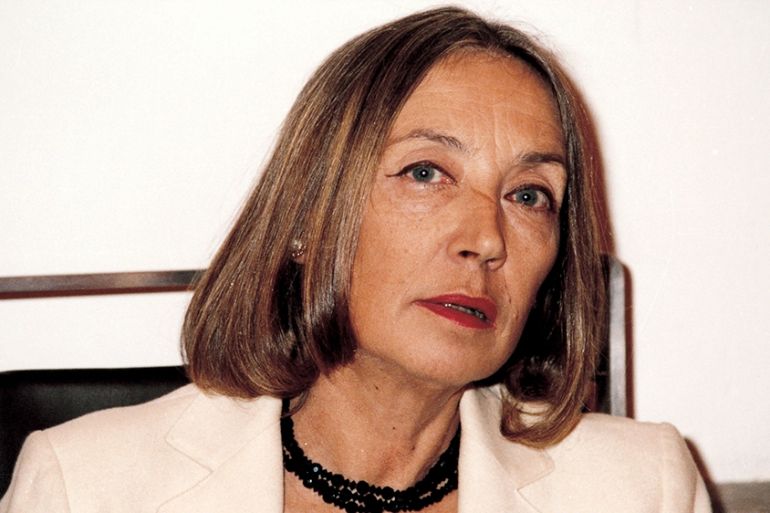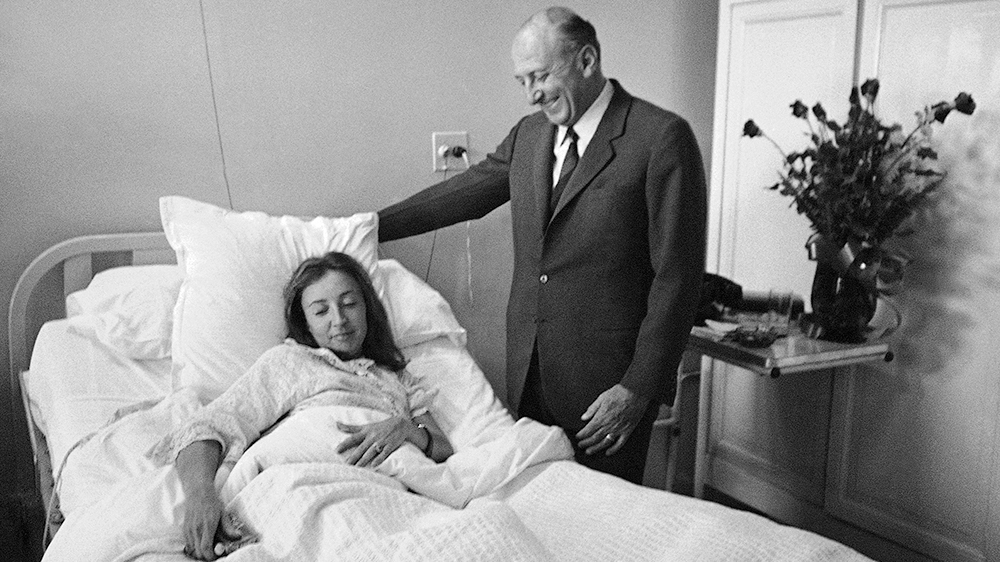The resurgence of Oriana Fallaci’s anti-Islam message in Italy
As Italy jolts further right, a late reporter who warned against Islam and Muslims is viewed as a prescient figure.

Rome, Italy – At his political rally in Milan in March, Italy’s far-right Minister of Interior and Deputy Prime Minister Matteo Salvini mentioned two women: the Virgin Mary, who, he said “will lead us to victory”, and Oriana Fallaci, whom he described as “the founding mother of this Europe”.
One of Italy’s most famous journalists, Fallaci, who died in her late seventies in 2006, covered the Vietnam War and interviewed the likes of Henry Kissinger, Indira Gandhi and Ruhollah Khomeini.
Keep reading
list of 4 items‘Prejudice, Islamophobia’: Free speech fears as UK redefines extremism
Police investigate if killer targeted women in Sydney mall stabbings
Why Biden’s White House iftar unravelled amid Gaza war
After September 11, she adopted an anti-Islam stance and today her legacy is enjoying a moment of renewed popularity.
In 2019 Italy, Fallaci’s unapologetic Islamophobia is alarmingly mainstream. The new ruling class is rediscovering Fallaci as a prescient thinker.
Streets or squares have been renamed after her in Pisa and Arezzo, in central Italy, and Genoa, further north.
A public garden was also dedicated to her in Sesto San Giovanni, an industrial town close to Milan, where the mayor also blocked the construction of a mosque and recently mentioned Fallaci in his inauguration speech: “Her exhortations to the West to wake up still resonate today.”
In July, the lower chamber of Parliament approved the creation of low-denomination treasury bills that could also be used as a de-facto parallel currency to the euro. According to the plan’s main proponent, the League’s MP Claudio Borghi, the 20 euro bill should bear a picture of Fallaci.
For what would have been her 90th birthday, state-owned television channel RAI 2 aired a celebratory documentary about her.
And Salvini has trumpeted his newly approved security bill as inspired by Fallaci.
At home, her ideas were not perceived as radical – her anti-Islam manifesto was first published in the country’s most prestigious newspaper.
But with rising anti-immigrant sentiment and with the far-right League party receiving almost 40 percent in the most recent elections, her message resonates with the current climate.
On September 28, 2001, a week after the September 11 attacks, Corriere della Sera, the Milan-based newspaper, published a five-page article titled La Rabbia e l’Orgoglio, or Rage and Pride, in which Fallaci accused the West of being too soft on Islam and Muslim immigrants.
In Italy, she argued, “there is no place for muezzins, minarets, fake teetotalers, their f****** middle ages, and their f****** chadors.”
From then on until her death, Fallaci stirred anti-Muslim sentiment.
”[Fallaci
a darling of the right precisely because she was a public figure previously associated with the left.”]
After the article in 2001, she wrote three books – The Rage and the Pride, The Force of Reason, and Oriana Fallaci Interviews Herself – in which she described the Muslim world as an “enemy we treat as a friend” and warned Europe about what she believed to be the danger of becoming “Eurabia”.
She borrowed the term from a conspiracy theory popularised by the Egyptian-born British writer Bat Ye’or (a pseudonym for Gisele Littman) about an alleged plan to “Islamise” Europe through mass immigration.
A few months before her death, Fallaci famously said she was ready to blow up the minaret of a mosque in Chianti because she did not want to “see a 24-metre minaret in the landscape of Giotto when I can’t even wear a cross … in their country!”.
More than a decade later, her influence on Italian public life has strengthened.
“The fact that Oriana Fallaci took such decisive positions after 9/11 transformed her into a figure of reference for the right,” said Francesco Borgonovo, deputy director of the conservative newspaper La Verita.
He claimed that Fallaci was often criticised for warning Western governments against immigration from Muslim-majority countries, but she understood that “in the face of a certain Islam, it is dangerous to say hurray to multiculturalism.”
Before being revered by the Italian right, Fallaci was a respected war reporter, essayist and political interviewer.
“She was the most famous Italian journalist in the world,” said Ugo Tramballi, war correspondent and columnist for the newspaper Il Sole 24 Ore.
He said that while Italy had other prominent journalists, “none of them was known outside Italy and has had bylines on great American magazines as did Fallaci.”
Her interrogative interview style, in which she was vocal about her own opinions, contributed to her popularity.
“When Oriana Fallaci was going to follow the news, she became the news,” said Tramballi.

The daughter of an anti-fascist partisan, Fallaci wrote about the moon landing, interviewed Robert Kennedy and was injured during the repression of student movements in Mexico in 1968.
Some view Fallaci’s early career, sometimes aligned with liberal causes, as distinct from her later days as an anti-Islam polemicist.
But Borgonovo, the conservative commentator, said they are two sides of the same coin: “The reasons behind her attacks against a certain kind of Islam were the same than those behind her previous battles. She was a feminist, a woman of the left and a libertarian.”
Leonardo Bianchi, news editor of Vice Italy, who wrote a book about Italian populism, sees it differently.
According to him, after September 11, Fallaci became “a darling of the right precisely because she was a public figure previously associated with the left”.
She exemplified that “even ideologically unwholesome people understand that the threat [of Islam] is serious and something needs to be done.”
After the Charlie Hebdo attack in Paris, Fallaci’s work resurfaced on social media platforms, with some arguing she was right to bemoan Islam after all.
Recently, social media savvy Salvini was photographed while reading one of her books on holiday.
And Facebook is now full of fans groups with names such as Oriana Fallaci, the power of truth and Aphorisms by Oriana Fallaci.
Fallaci is no longer a simple journalist but has become, said Bianchi, “a prophetess of misfortune who warned us that Islam wanted to attack us.”